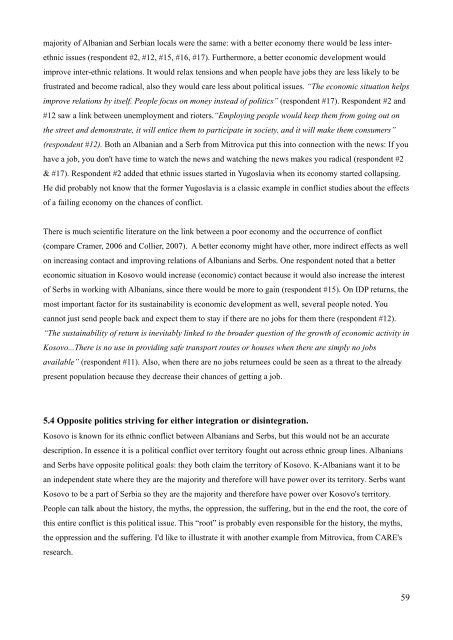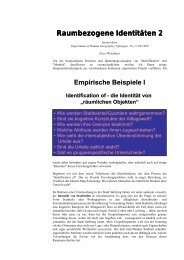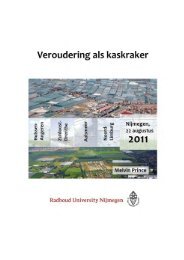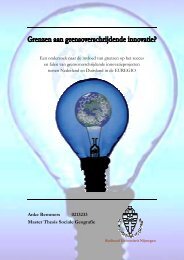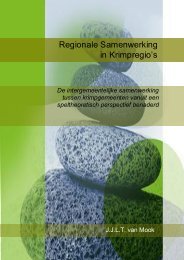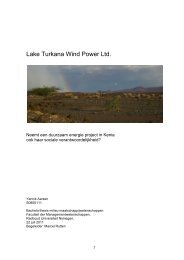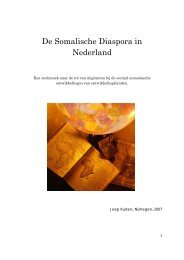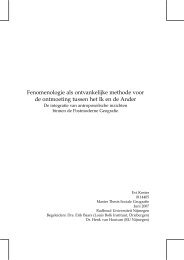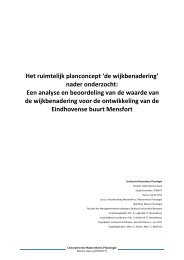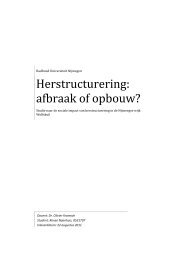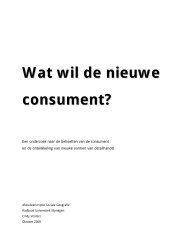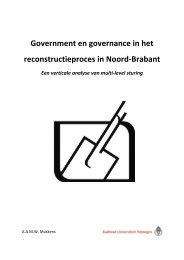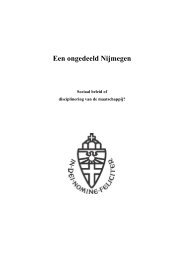Trading with the enemy in Mitrovica, Kosovo. - RUhosting
Trading with the enemy in Mitrovica, Kosovo. - RUhosting
Trading with the enemy in Mitrovica, Kosovo. - RUhosting
You also want an ePaper? Increase the reach of your titles
YUMPU automatically turns print PDFs into web optimized ePapers that Google loves.
majority of Albanian and Serbian locals were <strong>the</strong> same: <strong>with</strong> a better economy <strong>the</strong>re would be less <strong>in</strong>ter-<br />
ethnic issues (respondent #2, #12, #15, #16, #17). Fur<strong>the</strong>rmore, a better economic development would<br />
improve <strong>in</strong>ter-ethnic relations. It would relax tensions and when people have jobs <strong>the</strong>y are less likely to be<br />
frustrated and become radical, also <strong>the</strong>y would care less about political issues. “The economic situation helps<br />
improve relations by itself. People focus on money <strong>in</strong>stead of politics” (respondent #17). Respondent #2 and<br />
#12 saw a l<strong>in</strong>k between unemployment and rioters.“Employ<strong>in</strong>g people would keep <strong>the</strong>m from go<strong>in</strong>g out on<br />
<strong>the</strong> street and demonstrate, it will entice <strong>the</strong>m to participate <strong>in</strong> society, and it will make <strong>the</strong>m consumers”<br />
(respondent #12). Both an Albanian and a Serb from <strong>Mitrovica</strong> put this <strong>in</strong>to connection <strong>with</strong> <strong>the</strong> news: If you<br />
have a job, you don't have time to watch <strong>the</strong> news and watch<strong>in</strong>g <strong>the</strong> news makes you radical (respondent #2<br />
& #17). Respondent #2 added that ethnic issues started <strong>in</strong> Yugoslavia when its economy started collaps<strong>in</strong>g.<br />
He did probably not know that <strong>the</strong> former Yugoslavia is a classic example <strong>in</strong> conflict studies about <strong>the</strong> effects<br />
of a fail<strong>in</strong>g economy on <strong>the</strong> chances of conflict.<br />
There is much scientific literature on <strong>the</strong> l<strong>in</strong>k between a poor economy and <strong>the</strong> occurrence of conflict<br />
(compare Cramer, 2006 and Collier, 2007). A better economy might have o<strong>the</strong>r, more <strong>in</strong>direct effects as well<br />
on <strong>in</strong>creas<strong>in</strong>g contact and improv<strong>in</strong>g relations of Albanians and Serbs. One respondent noted that a better<br />
economic situation <strong>in</strong> <strong>Kosovo</strong> would <strong>in</strong>crease (economic) contact because it would also <strong>in</strong>crease <strong>the</strong> <strong>in</strong>terest<br />
of Serbs <strong>in</strong> work<strong>in</strong>g <strong>with</strong> Albanians, s<strong>in</strong>ce <strong>the</strong>re would be more to ga<strong>in</strong> (respondent #15). On IDP returns, <strong>the</strong><br />
most important factor for its susta<strong>in</strong>ability is economic development as well, several people noted. You<br />
cannot just send people back and expect <strong>the</strong>m to stay if <strong>the</strong>re are no jobs for <strong>the</strong>m <strong>the</strong>re (respondent #12).<br />
“The susta<strong>in</strong>ability of return is <strong>in</strong>evitably l<strong>in</strong>ked to <strong>the</strong> broader question of <strong>the</strong> growth of economic activity <strong>in</strong><br />
<strong>Kosovo</strong>...There is no use <strong>in</strong> provid<strong>in</strong>g safe transport routes or houses when <strong>the</strong>re are simply no jobs<br />
available” (respondent #11). Also, when <strong>the</strong>re are no jobs returnees could be seen as a threat to <strong>the</strong> already<br />
present population because <strong>the</strong>y decrease <strong>the</strong>ir chances of gett<strong>in</strong>g a job.<br />
5.4 Opposite politics striv<strong>in</strong>g for ei<strong>the</strong>r <strong>in</strong>tegration or dis<strong>in</strong>tegration.<br />
<strong>Kosovo</strong> is known for its ethnic conflict between Albanians and Serbs, but this would not be an accurate<br />
description. In essence it is a political conflict over territory fought out across ethnic group l<strong>in</strong>es. Albanians<br />
and Serbs have opposite political goals: <strong>the</strong>y both claim <strong>the</strong> territory of <strong>Kosovo</strong>. K-Albanians want it to be<br />
an <strong>in</strong>dependent state where <strong>the</strong>y are <strong>the</strong> majority and <strong>the</strong>refore will have power over its territory. Serbs want<br />
<strong>Kosovo</strong> to be a part of Serbia so <strong>the</strong>y are <strong>the</strong> majority and <strong>the</strong>refore have power over <strong>Kosovo</strong>'s territory.<br />
People can talk about <strong>the</strong> history, <strong>the</strong> myths, <strong>the</strong> oppression, <strong>the</strong> suffer<strong>in</strong>g, but <strong>in</strong> <strong>the</strong> end <strong>the</strong> root, <strong>the</strong> core of<br />
this entire conflict is this political issue. This “root” is probably even responsible for <strong>the</strong> history, <strong>the</strong> myths,<br />
<strong>the</strong> oppression and <strong>the</strong> suffer<strong>in</strong>g. I'd like to illustrate it <strong>with</strong> ano<strong>the</strong>r example from <strong>Mitrovica</strong>, from CARE's<br />
research.<br />
59


